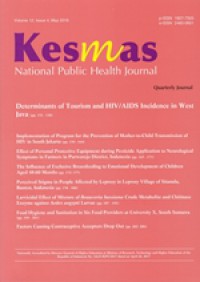
Jurnal
Implementation of Prevention of Mother to Child Transmission of HIV Program in South Jakarta
Even though Prevention of Mother to Child Transmission (PMTCT) program has been running in Indonesia since 2006, the proportion of human immunodeficiency virus (HIV)-infected pregnant women remains high in some districts in Indonesia. The PMTCT program aims to reduce transmission of HIV from mother to child. Thus it requires an examination of the PMTCT program implementation. The study was a qualitative study on PMTCT program implementation in South Jakarta, Indonesia, whereas the proportion of children with HIV positive in the area was quite high. The analysis used domain analysis by looking the implementation of PMTCT as a system consisting of input, process and output. PMTCT strategy is based on a comprehensive four-pronged strategy. This study found that scaling-up communication and education about PMTCT program from health provider to community was needed. In the first prong, there was no specific health provider for PMTCT program, it was still integrated with the MCH staff. PMTCT program did not disseminate information to the community. Therefore, it seemed that it was underutilized. In the second prong, implementation of HIV testing and counseling for couples of women living with HIV remained a bottleneck because women living with HIV felt fear to inform their HIV status to their partners. Thus, counseling and HIV testing for couples have not benefited at all. These women were unsatisfied with the quality of counseling, and the failure to provide antiretroviral treatments. This study found the low coverage and less responsiveness of PMTCT program to build a network of partners with various elements of government.
Availability
No copy data
Detail Information
- Series Title
-
Kesmas, National Public Health Journal, Vol. 12, Issue 4, May 2018
- Call Number
-
(05) 614 FAK k
- Publisher
- Depok : Fakultas Kesehatan Masyarakat UI., 2018
- Collation
-
Hlm. 159-164
- Language
-
English
- ISBN/ISSN
-
1907-7505
- Classification
-
(05) 614 FAK k
- Content Type
-
-
- Media Type
-
-
- Carrier Type
-
-
- Edition
-
Vol. 12, Issue 4
- Subject(s)
- Specific Detail Info
-
-
- Statement of Responsibility
-
-
Other version/related
No other version available
File Attachment
Comments
You must be logged in to post a comment
 Computer Science, Information & General Works
Computer Science, Information & General Works  Philosophy & Psychology
Philosophy & Psychology  Religion
Religion  Social Sciences
Social Sciences  Language
Language  Pure Science
Pure Science  Applied Sciences
Applied Sciences  Art & Recreation
Art & Recreation  Literature
Literature  History & Geography
History & Geography